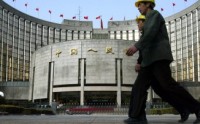Central Bank Clarifies Monetary Policy
 China's central bank revealed that it would consider using market measures to implement a dynamic fine-tuning of its monetary policy over the next six months in a second-quarter monetary policy report released on Wednesday evening.
China's central bank revealed that it would consider using market measures to implement a dynamic fine-tuning of its monetary policy over the next six months in a second-quarter monetary policy report released on Wednesday evening.
Despite the huge jump in lending in the first half year, the PBoC affirmed it would continue to stick to a moderately loose money policy to consolidate the country's economic growth.
In the meanwhile, the bank noted that it may use market tools to guide "appropriate" lending growth during the second half of this year.
In the first half year, Chinese banks extend a record 7.37 trillion yuan of new loans in the first, nearly 5 trillion yuan higher than the amount lent during the same period last year and already 2.37 trillion yuan above the government's target for lending over the whole year.
In fact, signs that the bank might begin to fine-tune its loose monetary policy began to appear in July. At that time, it required ten banks, including Bank of China, China Citic Bank, China Minsheng Banking Corporation and seven other joint-stock commercial banks to buy 100 billion yuan worth of one-year central bank notes. This was the first time such a move had been made in almost two years.
In the report, the bank said in order to maintain a reasonable and appropriate level of liquidity in the banking system, it had cumulatively issued repurchase agreements worth 2.29 trillion yuan and central bank bills worth 1.41 trillion yuan.
The bank also provided a break down of lending sources in the first half. Of the huge amount of funds that were released, new loans issued by state-owned and joint-stock commercial banks occupied nearly 72%, accounting for nearly 3.26 trillion yuan and 2.02 trillion yuan respectively.
The report also revealed that Chinese banks had offered 1.6 trillion yuan in the form of long-and-medium-term new loans devoted to infrastructure construction.
Noticeably absent from the report was in mention of the risk of inflation associated with the huge increase in money supply that took place during the first half.
Wires attributed Thursday's 2.11 percent drop in the benchmark Shanghai Composite Index to the release of the report which raised "worries about adjustments to monetary policy that might impact market liquidity."
Links and Sources
PBoC: PDF of Report (Chinese)
The views posted here belong to the commentor, and are not representative of the Economic Observer |
Related Stories
- New Lending in July Eased to 355.9 Billion Yuan
- I feel that some industries are expanding too rapidly. For example, housing prices are rising too fast, and housing sales are growing too fast
- Economists Predict New Loans Fell Sharply in July
- China's Monetary Policy Dilemma
- Loans from Four Main Banks Fall as Proportion of Total Lending
Popular
Briefs
- OPhones to Take on iPhone
- The 3G-enabled Lenovo Mobile OPhone is likely to provide stiff competition to Apple's iPhone in the China market.

- Source:China Mobile
- 6.4-Magnitude Quake Rocks West China
- A 6.4-magnitude earthquake struck China's western Qinghai province earlier this morning.
- Source:China Earthquake Networks Center

- TAX
- Taxing Times
- China's tax bureau aims to collect an additional 100 billion in tax before the end of the ...




















